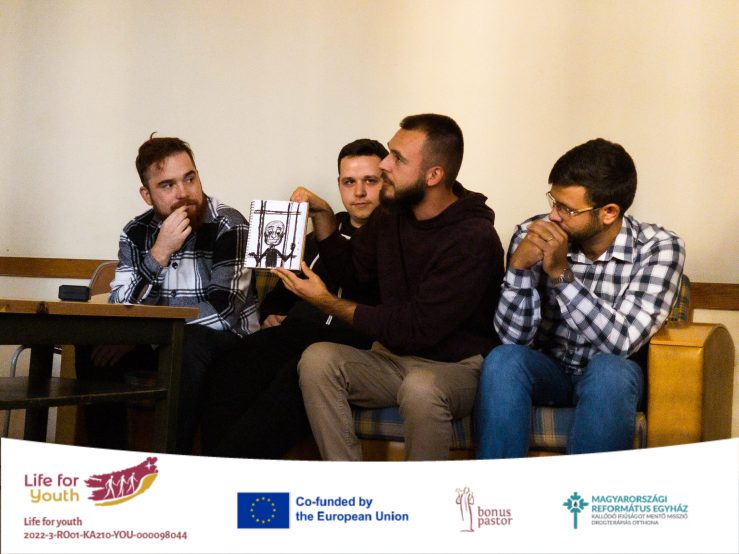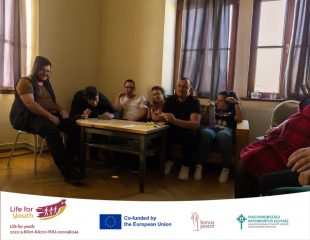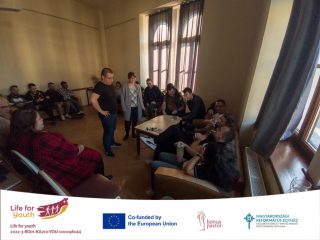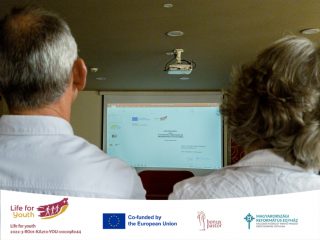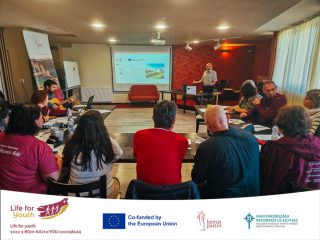Erasmus + – Life for Youth – Final conference – Romania

Life for Youth
2022-3-RO01-KA210-YOU-000098044
REPORT ON THE FINAL 3-DAY CONFERENCE
The Bonus Pastor Foundation organized the 3-day closing conference of the Life for Youth project across two locations: on September 25 at the Protestant Theological Institute in Cluj-Napoca, and on September 26-27 in Sovata.
The main objective of the 3-day final conference was to introduce the common curriculum created by the Bonus Pastor Foundation and MRE KIMM to professionals who had not participated in the project before (both from within and outside the partnership) and to train them on how to use the published manual effectively in their work. This manual is designed to support organizations and professionals engaged in youth drug prevention.
The conference attracted a diverse group of participants, including social workers, psychologists, mental health professionals, addiction counselors, teachers, psychotherapists, volunteer drug prevention facilitators, theologians, and other experts, all of whom registered in advance. Additionally, young people who had participated in testing the curriculum from the Life4Youth project were invited to share their feedback with the professionals and discuss their learning experiences from the program.
On September 25, the project and its curriculum were presented to 21 students at the Protestant Theological Institute in Cluj-Napoca. Interest was high, as pastors working in the community inevitably encounter people struggling with addiction and their families. Several students already had experience in related fields, worked in other helping professions, or volunteered with youth.
Following the introduction to the Erasmus+ Life for Youth project and the handbook, the training was divided into two major parts: learning and practicing life coaching techniques, and presenting and applying elements of the Portage model in youth drug prevention.
Dr. Levente Horváth, the author of the life coaching section of the handbook, emphasized the importance of self-awareness and life coaching techniques in preventing substance use and addiction among youth. These techniques help young people discover their identity and develop a healthy personality. His presentation was followed by a workshop where participants practiced motivational interviewing in pairs and through a “fishbowl” exercise, a method that promotes change and reinforces individual responsibility.
Dr. Éva Bartha, a clinical psychologist, conducted the second session, focusing on the application of the Portage model in youth drug prevention. During practical exercises, participants role-played scenarios such as families dealing with addiction and school settings where peer pressure to use substances was addressed, practicing refusal skills. The exercises concluded with a supervised review. The day ended with a group evaluation, where attendees shared their experiences. One participant commented, “Thank you for this training. Although it was intense, it was worth it as I learned a lot both theoretically and practically, which was much needed,” and this sentiment was echoed by others.
The second and third days of training took place in Sovata on September 26-27. Professionals who registered for the training were introduced to the Erasmus+ Life for Youth project by project coordinator Csilla Henter. This was followed by an overview of the handbook and a detailed presentation of the drug prevention section by co-author Henter. Magdolna McAlister, a social worker and mental health specialist, presented on “Drug Prevention Based on the Portage Model,” which was followed by a round-table discussion where participating professionals shared their experiences from testing the curriculum. A distinctive aspect of the discussion was the input from young attendees, who provided feedback on their peers’ challenges and the areas where they most need support, as well as effective approaches to engaging them. Former addicts who now volunteer in prevention efforts also shared their insights and posed questions to the youth, resulting in an honest and informative dialogue.
The second day began with a workshop titled “How Close Am I to the Drug Problem?” where professionals engaged in hands-on practice on conducting prevention sessions in schools. After a break, there was a brief introduction to the life coaching section of the handbook, followed by Dr. Horváth’s presentation on “Counseling in Life Coaching: Methods and Techniques.” He highlighted the role of life skills coaching in prevention, as it aids in personal development and helps youth navigate the transitions of adolescence and young adulthood. The focus was on building resilience, decision-making and communication skills, strengthening self-esteem, setting positive goals, and fostering responsibility—fundamental pillars of personal growth. The techniques were organized into five main themes: establishing self-awareness, improving family relationships, enhancing interpersonal skills, reinforcing self-restraint and conflict resolution, and promoting mental health. He also discussed the role of Bible-based pastoral care, noting that the search for identity during adolescence often involves seeking answers to fundamental life questions.
The afternoon session featured a young participant who shared how the prevention program had positively impacted him, followed by another workshop. Dr. Bartha outlined the essential components of a drug prevention lesson plan, after which the professionals worked together to develop one.
In the closing evaluation, participants highlighted that the conference provided valuable and practical insights that they could successfully incorporate into their drug prevention work, enhancing the quality of youth-focused prevention programs with the help of the handbook.
